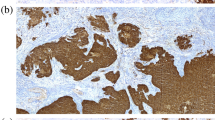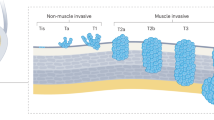Abstract
Although patients with superficial bladder cancer (Ta, T1) have a generally good prognosis, those patients who develop muscle-invasive tumours or metastatic disease at recurrence do poorly clinically. In the current study 69 patients undergoing complete transurethral resection for superficial transitional cell cancer of the bladder were investigated for different clinical and biological characteristics as possible prognostic factors: age, sex, performance of instillation therapy and immunohistochemical determination of mutational inactivation of p53 tumour-suppressor gene (monoclonal antibody PAb 1801) as well as immunohistochemical determination of the proliferation rate by staining for PCNA (proliferating cell nuclear antigen) (monoclonal antibody PC 10). After a median follow-up of 45.8 months, 12 of 14 patients (85.7%) with more than 20% of cells positive for p53 had disease progression with muscle-invasive growth compared with only one of 55 patients (1.8%) negative for p53 (P < 0.01, chi 2 test). During univariate analysis histological grade (G1 vs G2) (P = 0.0373), positivity for PCNA (> 60% of cells) (P = 0.0033) and positivity for p53 (P < 0.001) were significant prognostic factors for disease progression (log-rank test), while during multivariate analysis only positivity for p53 was a significant predictor for relapse of bladder cancer (P = 0.0029) (multivariate Cox regression analysis). The immunohistochemical detection of mutations of the p53 gene has been demonstrated to be a reliable, easily performed and thereby widely available technique for the investigation of fresh-frozen or paraffin-embedded tumour specimens. The results demonstrate the important role of the p53 tumour-suppressor gene protein in the development and for the progression of bladder cancer. If the high prognostic value of p53 mutations in superficial bladder cancer is confirmed in larger prospective trials, more aggressive therapeutic strategies could be discussed for patients with p53 mutations in their tumour specimens.
This is a preview of subscription content, access via your institution
Access options
Subscribe to this journal
Receive 24 print issues and online access
$259.00 per year
only $10.79 per issue
Buy this article
- Purchase on Springer Link
- Instant access to full article PDF
Prices may be subject to local taxes which are calculated during checkout
Similar content being viewed by others
Author information
Authors and Affiliations
Rights and permissions
About this article
Cite this article
Serth, J., Kuczyk, M., Bokemeyer, C. et al. p53 immunohistochemistry as an independent prognostic factor for superficial transitional cell carcinoma of the bladder. Br J Cancer 71, 201–205 (1995). https://doi.org/10.1038/bjc.1995.41
Issue Date:
DOI: https://doi.org/10.1038/bjc.1995.41
This article is cited by
-
p53 null phenotype is a “positive result” in urothelial carcinoma in situ
Modern Pathology (2022)
-
Individual patient risk of progression of urinary bladder papillary tumors estimated from biomarkers at initial transurethral resection of bladder tumor
Journal of Cancer Research and Clinical Oncology (2019)
-
Role of chemokine C-C motif ligand-1 in acute and chronic pulmonary inflammations
SpringerPlus (2016)
-
Molecular targets and targeted therapies in bladder cancer management
World Journal of Urology (2009)
-
Strategies for molecular expression profiling in bladder cancer
Cancer and Metastasis Reviews (2009)



